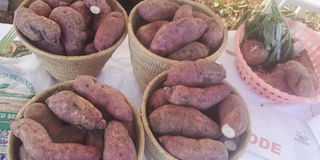He quit big job to live his dream in potatoes

Farmers are embracing value chain in their producst to earn more
What you need to know:
After quitting his job five years ago to chase his dream in farming, Cletie Lukusa has never regretted. He has found profit in adding value to the orange sweet potatoes, writes Charles Tabu Gazzaman.
For all the uncertainty there is in farming, not very many corporates are willing to abandon their office jobs to till the land.
Cletie Lukusa, however, belongs to the rare breed of elite risk takers. After years of enjoying the comfort that comes with a fat pay cheque at USAID, Lukusa called it quits to — of all things — become a potato grower. He now beams with a smile, boasting of living his long sought dream.
On top of his farming work, Lukusa also works as marketing and product development manager at International Food Policy Research Institute (IFPRI).
Growing
Lukusa embarked on orange sweet potato farming five years ago.
“I decided to quit and pursue something different. I wanted to live my dream. And that dream was in the orange potato,” he says, adding “I bought a piece of land in Gomba about 10 acres and immediately rolled off.” According to Lukusa, all the varieties of the orange sweet potatoes are high-yielding. “The potato sprouts in well prepared soils powered with fertilisers. After 90 days, a farmer should be able to begin the harvest,” he says.
“I make a lot of money after adding value to my orange-fleshed Vitamin A-rich potatoes,” says Lukusa who grows his potatoes on a 10-acre farm in Gomba District.
Lukusa processes and packages flour made from these potatoes.
“Orange sweet potatoes are very profitable when you add value to them,” explained Lukusa who was among the hundreds of farmers showcasing their products at the just concluded National Agricultural Trade Show in Jinja.
Food
Before value addition, Leila Kyazike, who is a farmer and also a nutritionist with HarvestPlus, says the orange sweet potato has very many attributes.
“The vines can be eaten as vegetable. Besides the tradition of eating the root boiled, we have discovered its chips are so nutritious. With just Shs200, 000, anyone can venture into orange sweet potato chips making business because the returns are more than double,” she says.
Value addition
Lukusa says farmers must take to value addition if they are to earn a visible income.
“Value addition is the only shortcut to profits. Farmers ought to be informed that these days several companies are here to help in value addition. I did embrace it and I have never had regrets. I started value addition in 2015 and I remember making Shs3m in Mbale during the agrikool youth event,” he said.
Products
According to Lukusa, after drying the orange-fleshed sweet potatoes they are then threshed and milled to obtain the flour orange in colour before packaging in one kilogramme branded packs.
“The orange flour does very many things including porridge rich in vitamin A,” he said. The flour can also be bought by several confectionary making companies as a substitute to wheat. “The flour is a bi product of several confectionaries like the cakes and bread. One kilogramme of flour costs Shs5, 000,” Lukusa further explained.
Profits
“Adding value to the orange sweet potatoes is very profitable. Since 2015, I have been saving over Shs6m from a capital of as little as Shs600, 000. Which has enabled me to educate my siblings besides building a permanent home,” revealed Lukusa.
He says he has now taken to educating farmers about the profitability venturing into potatoes farming.
“The response is positive and so far we have many groups of farmers majoring in the orange sweet potatoes. We have groups of farmers in the districts of Kamuli, Soroti, Masaka and Mbale among other,” he says.
Challenges
According to Cletie Lukusa, the biggest challenge he and other farmers face revolves around marketing. “It is all about perception, otherwise Ugandans should embrace our products because they are rich in nutrients like the vitamin A which is vital for growth,” he says.
Facts
Any orange sweet potato variety can be dried to make chips, which can then be milled into flour.
Dried sweet potato chips can be stored for up to six months when packaged in airtight, strong, black plastic bags. Sweet potato flour is used to make doughnuts and pancakes.Flour made from the chips can also be used to make high-value flours by mixing with millet, maize or soybean flour. These mixed flours are used to make porridge and baby foods, which are easily digestible.Some bakeries are already using new flour mixes to make bread and cakes.
The poultry feed industry is showing interest in using orange-fleshed chips in their feeds to improve yolk colour and vitamin A content of eggs.
Procedure
Step 1: Choosing the roots
Use any orange sweet potato variety.
Step 2: Washing
Wash the orange sweet potatoes in clean water in large buckets, changing water as frequently as required.
Step 3: Draining
After washing, drain by placing the sweet potatoes on a raised, perforated rack.
Step 4: Chipping or slicing
Chip the washed sweet potatoes to uniform size (3-6 mm thick). You can slice them manually with a sharp knife or use a manual or motorized chipper to speed-up the process.
Step 5: Drying
Orange sweet potato chips should be evenly spread on a raised platform, preferably on a clean black plastic sheet, to sun dry.
Step 6: Milling
Mill dried chips to flour using a hammer mill (village “posho” mill).
Step 7: Packaging and labeling
Pack chips or flour in strong (thick gauge) black polyethylene bags. Flour can be packaged in two kg packs for distribution to shops and other retail outlets.




